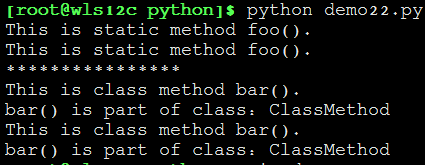Python学习笔记12—类
典型的类和调用方法:
#!/usr/bin/env Python # coding=utf-8 __metaclass__ = type #新式类 class Person: #创建类 def __init__(self, name): #初始化函数 self.name = name
def getName(self): #类中的方法(函数) return self.name
def color(self, color): print "%s is %s" % (self.name, color)
girl = Person('wangguniang') #实例化 name = girl.getName() #调用方法(函数) print "the person's name is: ", name girl.color("white") #调用方法(函数) print "------" print girl.name #实例的属性
运行结果:

self 的属性数据,也不一定非得是由参数传入的,也可以在构造函数中自己设定
#/bin/env/python #coding:utf-8 __metaclass__ = type class Person: def __init__(self, name,general="male"): self.name = name self.email = "zy5724@163.com" self.general = general info = Person("keven") print "info.name=",info.name print "info.email=",info.email print "info.general=",info.general
运行结果:

继承
#!/usr/bin/env python # coding=utf-8 __metaclass__ = type class Person: def speak(self): print "I love you." def setHeight(self, n): self.length = n def breast(self, n): print "My breast is: ",n class Girl(Person): def setHeight(self): print "The height is:1.70m ." #方法重写 if __name__ == "__main__": cang = Girl() cang.setHeight() cang.speak() cang.breast(90)
运行结果:

多重继承:
#/usr/bin/env python __metaclass__ = type class Person: def speak(self): print "Hello,world!!!" def name(self,n): print "My name is: ",n class Man: def role(self,r): print "I'm a ",r class Boy(Person,Man): def food(self): print "I like drink milk." if __name__ == "__main__": keven = Boy() keven.speak() keven.name("keven") keven.role("student") keven.food()
运行结果:

继承的特点,即将父类的方法和属性全部承接到子类中;如果子类重写了父类的方法,就使用子类的该方法,父类的被遮盖。
super 函数
super 函数的参数,第一个是当前子类的类名字,第二个是 self,然后是点号,点号后面是所要调用的父类的方法。
#/usr/bin/env python __metaclass__ = type class Person: def speak(self): print "Hello,world!!!" def name(self,n): print "My name is: ",n class Man: def role(self,r): print "I'm a ",r class Boy(Person,Man): def food(self): print "I like drink milk." def speak(self): print "I'm a boy." super(Boy,self).speak() if __name__ == "__main__": keven = Boy() keven.speak() keven.name("keven") keven.role("student") keven.food()
其中“super(Boy,self).speak() ”也可以通过”Person.speak(self)”调用speak方法。
执行结果:

静态方法和类方法
- @staticmethod 表示下面的方法是静态方法
- @classmethod 表示下面的方法是类方法
- 静态方法中的参数没有self,
- 类方法的参数也没有 self,但是必须有 cls 这个参数
# coding=utf-8 __metaclass__ = type class StaticMethod: @staticmethod def foo(): print "This is static method foo()." class ClassMethod: @classmethod def bar(cls): print "This is class method bar()." print "bar() is part of class:",cls.__name__ if __name__ == "__main__": static_foo = StaticMethod() #实例化 static_foo.foo() #实例调用静态方法 StaticMethod.foo() #通过类来调用静态方法 print "****************" class_bar = ClassMethod() #实例化 class_bar.bar() ClassMethod.bar()
执行结果:

封装和私有化
python 中私有化的方法也比较简单,就是在准备私有化的属性(包括方法、数据)名字前面加双下划线。
用了@property 之后就可以调用被封装的私有属性了。
#!/usr/bin/env python #coding=utf-8 __metaclass__ = type class ProtectMe: def __init__(self): self.me = "Keven" self.__name = "Rock" #封装 @property #调用私有属性 def name(self): return self.__name if __name__ == "__main__": p = ProtectMe() print p.name


 浙公网安备 33010602011771号
浙公网安备 33010602011771号